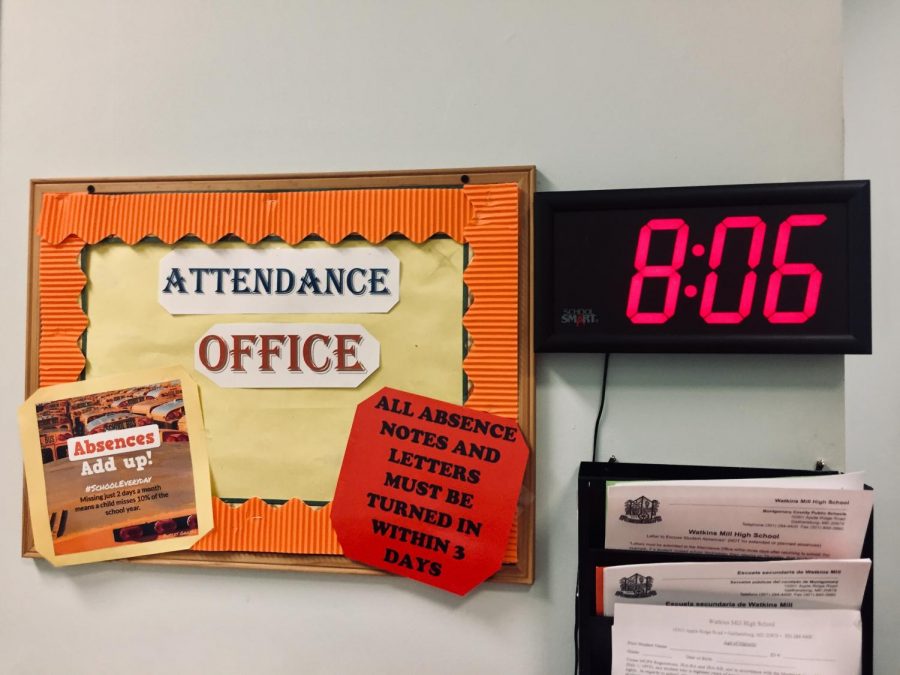Is attendance as important as mastery when determining graduation eligibility?
Students who are known for being tardy or absent often report to the attendance office for notes, signing in, or other issues.
June 6, 2019
According to a recent Washington Post article, more than 40 percent of the Watkins Mill High School senior class had 20 or more absences, prompting the question of whether Montgomery County Public Schools students should be allowed to graduate with excessive absences.
The reason that a student is absent “varies from student to student, especially at a school like [WMHS],” social studies teacher Matthew Quinn said. “There are going to be some students with special circumstances. [Sometimes] they have to work a job, or two jobs, or they have to look after a family member.”
This year, Watkins Mill began offering a credit recovery program to help students who want to complete their high school education, but were not able to pass a class the first time due to a variety of issues. This eliminates the need to pay for a summer school class or take the course again after school, which can be difficult for students who need to work.
Staff development teacher Kerrin Torres-Meriwether said that out of the 94 students enrolled in the credit recovery class, at least seven students are already parents and at least another 20 students work to assist their families. These students do not always have the ability to be in class as often as some of their peers.
“Without these online study and bridge workshop classes [as well as] the support of the teachers, counselors, and administrators, many of our students would not have been able to earn their graduation requirements,” Torres-Meriwether said.
During first semester, 23 students recovered a total of 30 credits. During second semester, 56 students recovered a total of 104 credits.
Thirty-one students are still working towards recovering 39 credits and over 330 PARCC/HSA Bridge projects were completed in English, Algebra, and NSL this year.
“There are many factors that can keep our students from being in school,” Torres-Meriwether said. “Students who are parents are responsible for another person, so if that child is sick, they need to take care of their own child first. There have been instances of students losing a family member and they need to stay home to take care of siblings.”
There are many factors that can keep our students from being in school.
— staff development teacher Kerrin Torres-Meriwether
“Attendance is behavioral, it’s not necessarily related to knowledge,” science teacher Laura Davis Vaughan said. “We don’t grade behavior, we grade knowledge.”
Principal Carol Goddard believes the root of attendance issues might lay in the grading systems and education policies.
Goddard said, “I don’t think this [attendance] epidemic is going to go away for a while, as long as we have the policy the way it is, it’s going to stay the way it is. The kids that will do well, will do well. The kids that have trouble with the work, will struggle.”
Senior Andre Tulloch, who will be speaking at graduation on June 7, believes viewing attendance as a graduation requirement is less important than demonstrating mastery in the required courses.
“When looking at attendance, it’s not taking into account other factors that might hinder a student from being in school like working multiple jobs or taking care of younger siblings,” Tulloch said. “So it shouldn’t be as big of a factor [in determining graduation] as it is at the moment.”
Tulloch, a recipient of the POSSE scholarship, missed many days of school this year due to college visits, scholarship interviews, family obligations, and meetings with corporations in Washington, DC. “These meetings were to discuss public health and the greater good,” Tulloch said. “I missed school to speak on things that weren’t being spoken on.”
While everyone agrees that attendance is important to the learning process, not everyone agrees on what, if any, the consequences should be if a student is chronically absent. “If you miss more than [a specific number] of classes, you shouldn’t necessarily be allowed to participate in [the graduation ceremony],” social studies teacher Richard Obando said. “If high school was important to you, then you would have been here.”
Davis Vaughan added, “If someone has done everything they need to do to graduate and has mastered the knowledge, then they should graduate from high school. Period.”
Torres-Merriwether feels it is important to judge cases on an individual basis. “There is a [different] story for everybody,” she added.



